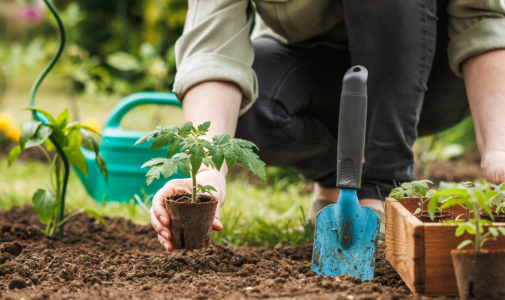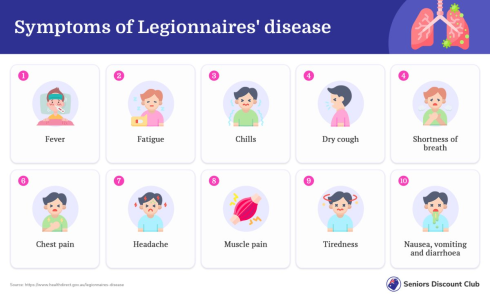Gardening joy or hidden threat? Authorities warns of severe health risk over soil contaminants
By
Gian T
- Replies 34
As the sun shines brighter and the flowers bloom, many of us in Western Australia eagerly roll up our sleeves to delve into the joys of springtime gardening.
However, amidst the excitement of nurturing our green spaces, there's a hidden danger lurking in the soil that could seriously threaten our health.
It's a reminder that sometimes, the most innocuous activities can carry unexpected risks.
The WA Department of Health has warned all garden enthusiasts about a potential increase in Legionnaires' disease, a severe form of pneumonia caused by the legionella bacteria.
This warning isn't to be taken lightly, as the disease can be contracted by simply breathing in dust from soil products, such as potting mix and compost, which are contaminated with the bacteria.
Since the beginning of 2020, there have been 187 notifications of Legionnaires' disease linked to garden soils or potting mix in Western Australia, with many cases requiring hospitalisation.
Acting executive director of environmental health, Peter Gray has advised gardeners on simple yet effective measures to reduce the risk of exposure.
‘This includes wearing gloves and a well-fitting disposable face mask, opening bagged potting mix carefully using scissors and keeping potting mix damp while in use,’ he said.
‘People should also wash their hands after handling potting mix and before removing their mask, and always store your potting mix in a cool, dry place, out of the sun.’
You should also store your potting mix in a cool, dry place away from direct sunlight.
Legionella longbeachae, the bacteria responsible for Legionnaires' disease, is commonly found in gardening products, including bagged potting mix, mulch, and compost.
Another strain, legionella pneumophila, can contaminate water systems such as air conditioning cooling towers, whirlpool spas, fountains, misting systems, and shower heads.
Legionnaires' disease symptoms can resemble a severe flu infection and may develop up to 10 days after exposure.
These symptoms include fever, chills, muscle and joint aches, a dry cough, severe headaches, fatigue, loss of appetite, and shortness of breath.
The risk of illness and the severity of the infection are higher for older individuals, smokers, or those with weakened immune systems, with up to 10 per cent of cases proving fatal.
Just last month, Victoria's Department of Health announced the resolution of an outbreak that saw 114 confirmed cases of Legionnaires' disease, with many of the affected individuals being adults over 40 who required hospitalisation, including intensive care.
In a separate update, health officials advise gardeners to use masks and gloves to prevent Legionnaires' disease, which can be contracted from potting mix, mulch, and compost.
New South Wales Health reported 54 cases of the disease last year, compared to 132 cases the year before. You can read more about it here.
 Have you or someone you know ever encountered a health scare related to gardening? Share your experiences and tips in the comments below.
Have you or someone you know ever encountered a health scare related to gardening? Share your experiences and tips in the comments below.
However, amidst the excitement of nurturing our green spaces, there's a hidden danger lurking in the soil that could seriously threaten our health.
It's a reminder that sometimes, the most innocuous activities can carry unexpected risks.
The WA Department of Health has warned all garden enthusiasts about a potential increase in Legionnaires' disease, a severe form of pneumonia caused by the legionella bacteria.
This warning isn't to be taken lightly, as the disease can be contracted by simply breathing in dust from soil products, such as potting mix and compost, which are contaminated with the bacteria.
Since the beginning of 2020, there have been 187 notifications of Legionnaires' disease linked to garden soils or potting mix in Western Australia, with many cases requiring hospitalisation.
Acting executive director of environmental health, Peter Gray has advised gardeners on simple yet effective measures to reduce the risk of exposure.
‘This includes wearing gloves and a well-fitting disposable face mask, opening bagged potting mix carefully using scissors and keeping potting mix damp while in use,’ he said.
‘People should also wash their hands after handling potting mix and before removing their mask, and always store your potting mix in a cool, dry place, out of the sun.’
You should also store your potting mix in a cool, dry place away from direct sunlight.
Legionella longbeachae, the bacteria responsible for Legionnaires' disease, is commonly found in gardening products, including bagged potting mix, mulch, and compost.
Another strain, legionella pneumophila, can contaminate water systems such as air conditioning cooling towers, whirlpool spas, fountains, misting systems, and shower heads.
Legionnaires' disease symptoms can resemble a severe flu infection and may develop up to 10 days after exposure.
These symptoms include fever, chills, muscle and joint aches, a dry cough, severe headaches, fatigue, loss of appetite, and shortness of breath.
The risk of illness and the severity of the infection are higher for older individuals, smokers, or those with weakened immune systems, with up to 10 per cent of cases proving fatal.
Just last month, Victoria's Department of Health announced the resolution of an outbreak that saw 114 confirmed cases of Legionnaires' disease, with many of the affected individuals being adults over 40 who required hospitalisation, including intensive care.
In a separate update, health officials advise gardeners to use masks and gloves to prevent Legionnaires' disease, which can be contracted from potting mix, mulch, and compost.
New South Wales Health reported 54 cases of the disease last year, compared to 132 cases the year before. You can read more about it here.
Key Takeaways
- Gardeners in Western Australia have been warned about a potential increase in legionnaires' disease during the spring planting season.
- The disease is contracted by inhaling dust contaminated with legionella bacteria, which can be present in garden soils or potting mix.
- The WA Department of Health advises gardeners to take safety precautions, such as gloves and masks when handling soil products.
- Symptoms of legionnaires’ disease resemble severe flu and can be particularly dangerous for older adults, smokers, or those with weakened immune systems.










